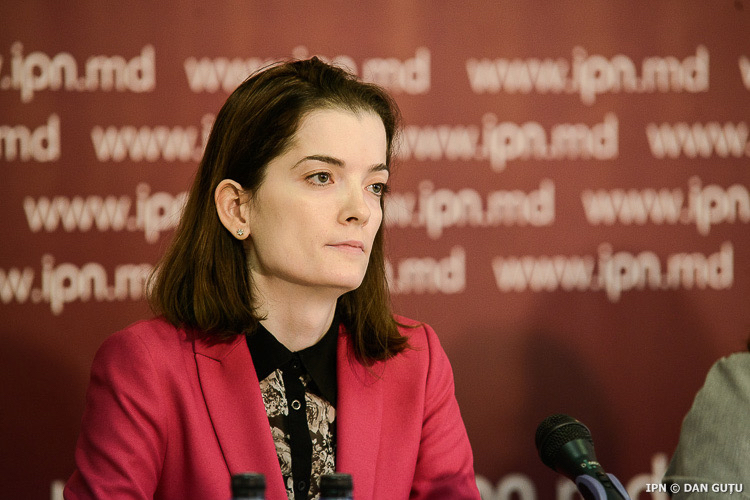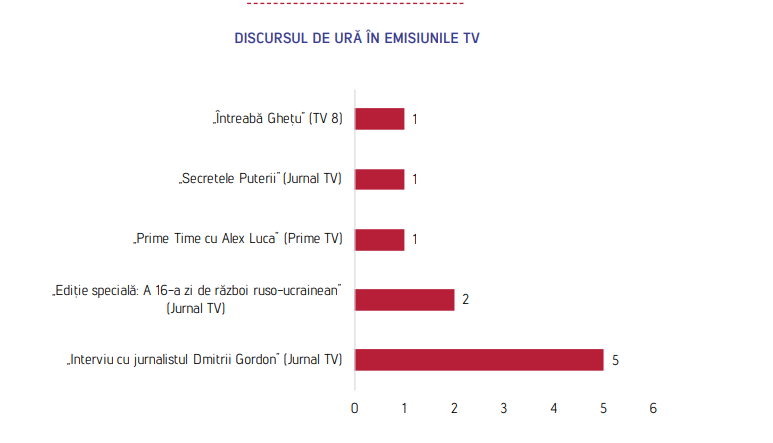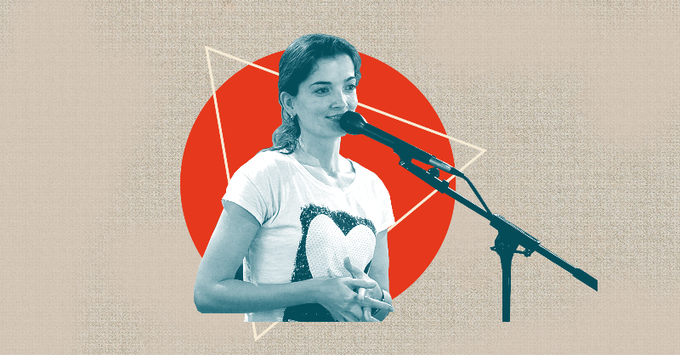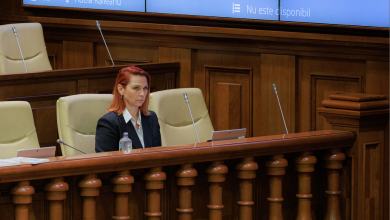Irina Corobcenco: “Hate Speech Is Not Freedom of Expression, and Those Who Use It Cannot Be Justified by This Right”

On June 18, the International Day for Countering Hate Speech was celebrated for the first time in world history. Meanwhile, on July 3, the legislative amendments referring to crimes motivated by prejudice will enter into force in Chisinau, and incitement to such actions, discrimination, or propaganda of genocide will entail punishment. Irina Corobcenco, who is in charge of monitoring hate speech at the Promo-LEX Association, discusses the new legal provisions, reflecting whether these steps are sufficient for combating the phenomenon, and what rules should be followed by the journalists.
Media Azi: To start with, could you please explain what hate speech is and how it could be identified? Besides, how can war propaganda be interpreted? And how are these two concepts interconnected?
Irina Corobcenco: Hate speech is any form of expression – written or verbal messages, drawings, images, poetry, songs, graffiti, etc. – which promotes, justifies, or incites hatred against a person or a group of persons on the basis of a specific characteristic of that person or group, such as language, religion, opinion, gender, ethnic origin, or any other feature. This type of speech is unacceptable; it cannot be tolerated or spread in any society due to its negative impact not only on the person or group it is aimed at, but on the entire society.
At the same time, war propaganda can be briefly described as incitement to conflicts and acts of aggression, and such actions imply promoting a specific group’s ethnic, racial, or religious hatred against another group. For instance, in the context of an armed conflict, the enemy is typically dehumanized, which is an example of hate speech. Otherwise stated, hate speech and incitement to violence are parts of war propaganda.
How is hate speech regulated by the legislation of the Republic of Moldova and what are the risks faced by those who promote it? Is the online media also included, or is it only about the offline press?
In April 2022, after almost six years, the Parliament of the Republic of Moldova adopted the Draft Law No 301/2016 on Regulating Bias Crimes in the final reading. The law was promulgated in May, and the amendments to the Criminal Code and the Contravention Code will enter into force in early July. Consequently, starting with July 3, according to Art. 346 of the Criminal Code, incitement to violent actions based on prejudice, i.e. preconceived ideas based on such issues as race, color, ethnic origin, etc., shall be punished with a fine equal to 500-600 conventional units (equivalent to 25 000-30 000 lei), or with 180-240 hours of unpaid compulsory community service, or 1-3 years of imprisonment.
Besides, propaganda of genocide and crimes against humanity, which represents a type of hate speech, shall be punished with a fine equal to 500-1000 conventional units (25 000–50 000 lei) or 1-3 years of imprisonment for individuals and with a fine equal to 2 000-5 000 conventional units (100 000-250 000 lei) with deprivation of the right to practice a specific activity for a term of 1 to 5 years or with liquidation for legal entities.
The Contravention Code was also amended by adding the new Article 70/1 “Incitement to Discrimination,” according to which, “intentional actions, public calls, spreading information, or other forms of information intended for the public, including via the media, in the form of written texts, drawings, or images, or using a computer system, aimed at inciting discrimination based on prejudice” shall be sanctioned with a fine equal to 20-80 conventional units (1 000-4 000 lei) for individuals and with a fine equal to 120-210 conventional units (6 000-10 500 lei) for persons holding major posts.
In addition, in late March 2022, the Parliament adopted the Draft Law No 347/2021 on Amending Regulatory Acts in the final reading; according to it, Art. 52 of the Electoral Code was supplemented by the paragraph “Prohibited Electoral Campaigning” whichinterdicts candidates’ use of hate speech and/or incitement to discrimination during the election campaign and/or in election campaign materials. The sanctions include fines from 150 to 250 conventional units (7 500-12 500 lei) for individuals and fines from 250 to 400 conventional units (12 500-20 000 lei) for legal entities.
At the same time, it should be mentioned that, in the Republic of Moldova, this type of speech is defined in the Law on Freedom of Expression, and a case regarding the use of hate speech shall be examined according to the Code of Civil Procedure. The Audiovisual Media Services Code also contains a definition of “hate speech,” and Article 84, p. (9) stipulates the sanctions for its use by the audiovisual media (fines from 40 000 lei to 70 000 lei for the first breach, from 70 000 lei to 100 000 lei for repeated breaches, and annulling the broadcasting license).
On the other hand, the Law on Ensuring Equality regulates incitement to discrimination as a form which is close to hate speech, and the Council for Preventing and Eliminating Discrimination and Ensuring Equality is only entitled to provide recommendations in individual cases. It may issue the minutes of stating a contravention, which is supposed to be further confirmed by the court. In other words, the Council cannot apply any sanctions by itself.

Are these provisions enough to reduce or prevent the presence of such messages in the public space?
They are not enough, because the mere existence of these provisions in the national legislation will not automatically eradicate hate speech. They have to be accompanied by drafting guides, instructions, etc. for the employees of the institutions empowered in this sphere, and workshops also have to take place. The institutions need to develop internal procedures for monitoring and collecting disaggregated data on hate speech and bias offenses. It goes without saying that the law has to be applied correctly. It is absolutely obvious and clear that adjusting the legal framework allows the authorities to take all the steps required to prevent and sanction this type of speech.
In the context of voting for this project, what should journalists pay attention to in their activity?
I suggest that they write and speak about cases of incitement to discrimination, promotion of genocide or crimes against humanity, or bias crimes in a well-documented and balanced manner. Such cases presented without leaving room for interpretation and manipulation will contribute to improving the level of information, understanding, and awareness within the community of readers, and encourage the authorities to take steps in order to apply the law correctly.
Where is the dividing line between lack of tolerance for hate speech and freedom of expression?
I believe we are discussing tolerating hate speech, rather than the lack of tolerance for this sort of speech. And this fact becomes especially obvious during election campaigns.
As to the right to freedom of expression, it should be mentioned that it includes freedom of opinion and freedom to receive or share information, but freedom of expression is not an absolute right, and it may be subject to some restrictions. According to the international standards and the national legislation, it can be practiced in several cases, including for such purposes as national security, territorial integrity, or public safety, protecting the order and preventing crime, and protecting health and morals, reputation, or rights of other persons. And precisely for the reason that hate speech affects people’s dignity, and sometimes can even result in breaching their rights or acts of violence against them, the guarantees of freedom of expression cannot be extended to hate speech. In other words, hate speech is not freedom of expression, and those who use it cannot be justified by this right.
In recent months, you have been monitoring hate speech and incitement to discrimination in the context of the war in Ukraine. We have seen the detailed conclusions in the report published last week. What are your personal impressions after conducting such an analysis? How serious is the situation?
Monitoring hate speech is always an emotionally charged process. If you are an empathetic person, you can understand well enough what the victims of this sort of speech feel. Apart from this aspect, during these two months of monitoring, we have witnessed a lot of irresponsibility on the part of many politicians, opinion leaders, journalists, moderators, etc. Personal, political, and electoral interests and issues related to increasing the audience, ensuring visibility, and so on make them bring messages of hatred, intolerance, and war propaganda into spaces and sources for widespread consumption of information, amplifying and spreading them.
At the same time, we have seen that many persons prefer playing the part of a “passive passer-by” in the public space, in the media, and online. “Why should I interfere if it doesn’t concern me?” is the principle of interpersonal relations in our society. For instance, during a public meeting, the mayor of Chisinau instigates discrimination. The mayor’s office employees keep silent. The press representatives keep silent. No one even tries to imagine how they could feel if the mayor instigates discrimination against them personally.
I believe the situation is causing concern. First, because hate speech is permanently present and different persons, depending on the context, do not hesitate to make use of this type of speech. Second, because in the case of certain groups, hate speech has already had its medium and long term negative impact, such as marginalization, stigmatization, discrimination, and acts of violence. In my opinion, this is the consequence of insufficient education for human rights and lack of responsibility. I suppose that our society needs to learn to respect the others’ dignity and also to be empathetic.
Could you please provide any examples from the press?
In general, hate speech does not refer to a single word or a sentence. Each case must be analyzed as a part of an entire message; therefore, I would prefer to invite your readers to read the monitoring report and to see the cases of hate speech which has taken different forms.
I could briefly mention the case generated by Alex Cozer, a journalist from Jurnal TV, who referred to prejudices against followers of Islam and negatively associated them with “violence” and “danger”: “… Today, it was announced that Putin and Shoigu were planning to send 16 000 Syrians to Ukraine… 16 000 Muslim hirelings who are going to fight, to kill, and to slaughter the Ukrainian Orthodox Christian people. It shows once again to what extent this Kremlin sociopath is in militant action for Christian values. (…) Imagine sending 16 000 mercenaries brought from Syria, the people who have been at war all their lives. All they know is warfare, and apart from that… they know nothing except war.”
As mentioned in the report, in the collective memory, this statement will be linked to the common prejudice that “all the Muslims are terrorists,” and also to the fake news known as the “story of the 30 000 Syrians” of 2016, which generated hate speech against Syrians, Muslims, migrants, etc.

According to the report, 83 cases of hate speech, including 17 on TV and 7 on social media, were identified. How do you explain the fact that most of them are on TV, in spite of the fact that the broadcasting field is regulated more strictly than the online one?
The report data is not exhaustive; it is based on the number and type of the sources monitored. During this monitoring cycle, we followed social networks in addition to media sources, politicians, and specific Telegram channels. This is why, in addition to the 7 cases detected in social networks, we came across another 26 cases in mobile applications. It shows us that, depending on the context, the authors, and their purposes, any source of information can be transformed into a source of propaganda and hatred.
On the other hand, our monitoring experience shows that it is impossible to cover all the sources. In other words, the activity of the Broadcasting Council cannot be based on monitoring activities only. All the service suppliers cannot be monitored at once, it is too much information. For this reason, I consider that the BC should promote the notification tool, which, I suppose, is one of the national mechanisms which could streamline the Council’s work for preventing and combating hate speech in the audiovisual media.
How would you recommend the press to describe real-life events to be sure that it does not promote hate speech? If a politician, for example, voices out such a message at an event, do we have to ignore it?
In my opinion, journalists can prevent spreading hate speech in journalistic materials primarily when they understand what prejudices and stereotypes are and are able to recognize cases of discrimination in all its forms. Therefore, my first recommendation is not to avoid documenting human rights issues, to talk to people whose rights have been breached, and to those who work in the sphere of human rights protection. This will help them understand the complexity of human rights violations better, including hate speech and bias crimes.
As to your example, I believe journalists are free to decide which information is important enough to share it with the public and which is not. I think, however, that it is very important for the press not to leave any examples of hate speech by a public person, be it a politician, an opinion leader, a civil servant, etc., without an alternative opinion and an explanation why the speech in question is hate speech and why it has to be treated as such. In my opinion, the media has the power to educate and punish those who generate hate speech, including when they spread intolerant messages intentionally using media platforms.
Among the groups affected by hate speech, there is a case aimed at a journalist. We would be interested to receive further details about it.
The case in question was generated by Komsomolskaya Pravda on its Telegram channel and was aimed at Lilia Burakovski, a journalist who expressed her opinion about the war in Ukraine and public discussions about the neutral status of the Republic of Moldova on social media. The message represented a sexist speech in which the journalist was addressed harsh words (“backchannel; bribed from the grants”).

In the report, you have stated that part of the identified hate speech was spread via social networks such as TikTok and Telegram. For instance, you have remarked that several news consumers migrated to Telegram after the Intelligence and Security Service had blocked some web pages. You suppose that the lack of alternative opinions transforms media platforms, including those in the online environment, into sources of hate speech and war propaganda. Should the authorities reconsider their decisions in this regard? How could hate speech be regulated or controlled on social networks, especially if some of its authors are anonymous?
In fact, based on the monitoring results, we have found that mobile applications, especially Telegram, have become a source of information and also a source of spreading war propaganda and hatred in the newly created context. The ISS’s decision to block certain web pages made some of them migrate to Telegram, and their consumers, and probably not only them, continued following the news from these sources – already in Telegram. What the authorities have to understand is that, when you have no clear rules for regulating online content, you do not develop them jointly and do not apply them either, but merely block certain pages, online media institutions or those who generate online content migrate to other platforms, applications, etc. to continue their activity. In my opinion, the fact that written and online media avoid or fail to present proper explanations, opinions of both parties or experts’ alternative opinions stating whether a specific message represented hate speech or justified and promoted the war, transforms them into sources of hatred and war propaganda.
What I think is crucial is that the authorities comply with the legislation. Neither in 2020, in the context of the COVID-19 pandemic, nor in 2022, in the context of the war in Ukraine, the criteria for the decision to block the web pages are known. It is unclear whether the monitoring process was based on the criteria demonstrating that the principles of proportionality and necessity were respected. From this point of view, I suppose that the authorities should ensure that they do not infringe on freedom of expression.
Hate speech online can only be prevented by education and information and awareness campaigns for online users, and they have to be implemented by the public authorities in partnership with media institutions, civil society, and other stakeholders. In addition, this type of speech in social media or mobile applications could be prevented and countered by using self-regulatory and monitoring tools developed and implemented by the social media companies, and also by the media institutions themselves.

Apart from the recommendations listed in the report, what should the authorities do in order to significantly reduce the phenomenon in question?
Combating hate speech requires constant efforts from all the stakeholders, which requires cooperation and communication. The recommendations formulated by Promo-LEX are important because they show the authorities the basic elements and actions from which the efforts for preventing and combating hate speech should start. Therefore, I would be glad to see that the steps are taken in the correct order, which means that the chances of omitting certain elements are much lower. I also think it is relevant to remember that, in 2018, Promo-LEX drew attention to the fact that all the institutions in charge of preventing and combating hate speech were supposed to develop internal tools for monitoring and collecting disaggregated data. The data for the last four years presented by Promo-LEX is useful and relevant, but the more data we have, the better the Government knows where to intervene, what kind of actions have to be developed, and who they have to be addressed to.
Meanwhile, the authorities can ensure that hate speech, incitement to discrimination, discrimination, or human rights violations are not spread by the representatives of the authorities themselves. It implies that the authorities must internally assess their staff’s predisposition to discrimination, and organize regular or constant training sessions for them depending on the results; they must also create the environment which contributes to respecting human rights.
I also think that the authorities and their representatives should speak openly and be proactive, especially in cases of hate speech. A message condemning hate speech will serve as a clear signal to society that preventing and combating it is the authorities’ priority and also a proof of solidarity with the victims of this type of speech.




